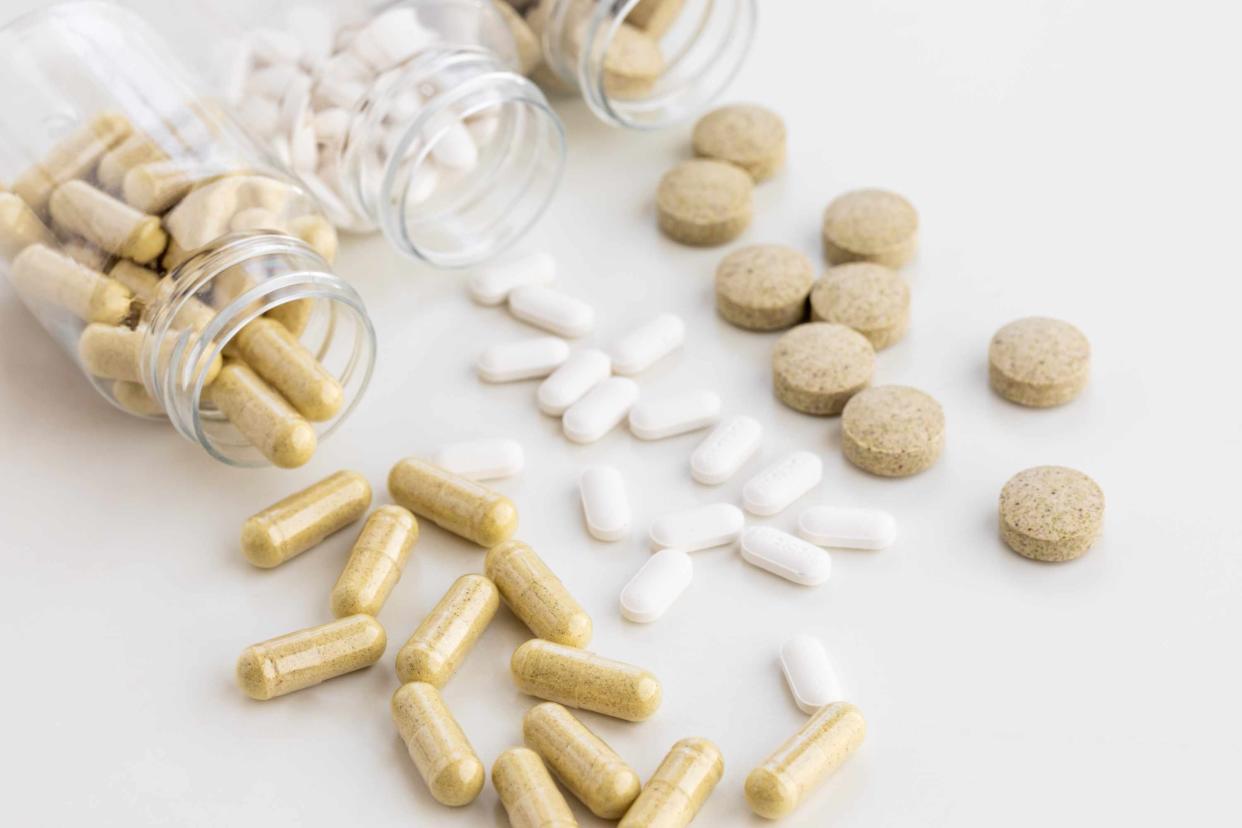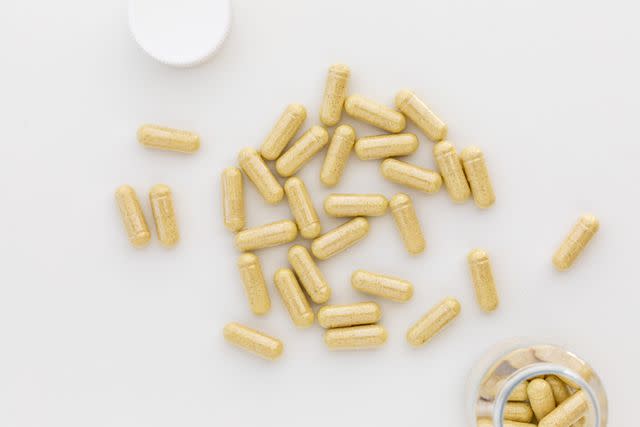What Are Digestive Enzymes?

Verywell / Anastasia Tretiak
Medically reviewed by Melissa Nieves, LND, RD
Digestive enzymes are proteins that help break down food into smaller parts so your body can easily use the nutrients. The enzymes are produced in different parts of the digestive system, including the mouth, stomach, pancreas, and small intestine.
Some people have problems making or using digestive enzymes. This can lead to nutrient deficiencies and other health conditions. In these cases, they may use prescription or over-the-counter (OTC) digestive enzyme products to supplement their levels.
This article discusses digestive enzyme supplements and when they may be recommended. It also looks at digestive enzyme side effects and precautions for using these products.
Types of Digestive Enzymes
The following are examples of digestive enzymes that occur naturally in the body. Some of these are also available as supplements or prescription products.
Enzyme | Where It's Made in the Body | What It Breaks Down |
Amylase | Saliva, pancreas | Complex carbohydrates and starches (in grains, beans, and starchy vegetables) |
Lactase | Small intestine | Lactose (a sugar in dairy products) |
Maltase | Saliva, pancreas | Maltose (a sugar in grains) |
Sucrase | Small intestine | Sucrose (a sugar found in fruit, nuts in small amounts, and veggies) |
Enzyme | Where It's Made in the Body |
Chymotrypsin | Pancreas |
Pepsin | Stomach |
Peptidase | Stomach, pancreas, small intestine |
Protease | Pancreas |
Trypsin | Small intestine |
Additional Digestive Enzymes
The following are enzymes that break down additional macronutrients in the body:
Lipase breaks down fat.
Elastase helps digest carbohydrates, fats, and proteins.
Both enzymes above are found in the pancreas.
Plant-Derived Enzymes
Select foods, including the following, also contain digestive enzymes:
Bromelain, from pineapple
Papain, from papaya
Both enzymes above digest proteins.
What Are Digestive Enzymes Used For?
Digestive enzymes help break down your food so your body can get the most nutrients. When this process is disrupted, you may experience discomfort (ex., bloating, gas).
Your body could become malnourished in more severe conditions where digestive enzymes aren’t produced or used efficiently. Over time, this can cause issues like osteoporosis.
Over-the-counter (OTC) supplements may be used in cases such as the following:
Digestive symptoms in autism spectrum disorder (ASD): Research on digestive enzymes for gut issues in people with ASD is mixed. However, some studies suggest they may help improve emotional response, behavior, and symptoms such as abdominal pain from lactose intolerance, vomiting, and selective eating. Further study is needed to confirm these findings.
Cancer treatment complications: Some studies suggested OTC enzymes improved the quality of life for people with colorectal cancer. However, further study is needed.
Celiac disease: Gluten-degrading enzymes like cysteine proteases, prolyl endopeptidases, and subtilisin have been studied as potential celiac disease treatments. However, the benefits of these enzymes are still unclear. And they risk worsening symptoms in some cases.
Fermentable carbohydrate digestion: An alpha-galactosidase supplement such as Beano can reduce symptoms like abdominal discomfort and bloating in people who have trouble digesting specific carbohydrates in beans.
Functional dyspepsia: A small study suggested that a combination enzyme product containing α-amylase, protease, cellulase, lactase, and lipase reduced indigestion symptoms related to functional dyspepsia. However, more research is needed; the study's authors were affiliated with the supplement manufacturer.
Inflammatory bowel disease (IBD): IBD includes ulcerative colitis (bowel disease) and Crohn’s disease (inflammation anywhere in the digestive tract, even the mouth). A small study found that a supplement containing beta-glucan, inositol, and digestive enzymes improved the quality of life in people with IBD.
Irritable bowel syndrome (IBS): In one study, digestive enzymes improved irritable bowel syndrome (IBS) symptoms. More study is needed to confirm these results.
Lactose malabsorption and intolerance: People with trouble digesting dairy may take OTC digestive enzymes like lactase to help prevent indigestion. Secondary lactose intolerance can also occur in people with IBD (Crohn’s, ulcerative colitis) and other diseases like celiac. Lactase may be also helpful in these instances.
Muscle soreness: OTC enzymes have been studied for treating sore muscles after exercise. However, the evidence supporting this use is not strong.
Osteoarthritis: A few studies found that certain enzymes, such as bromelain, trypsin, and/or rutin, reduced osteoarthritis pain. However, more research is needed.
People with more severe conditions (ex., exocrine pancreatic insufficiency (EPI), pancreatitis, surgical removal of the pancreas, cystic fibrosis) will likely need prescription enzyme replacement therapy (ERT).
Be sure to discuss your symptoms and use of digestive enzymes with your healthcare provider. OTC digestive enzyme supplements are not meant to treat life-threatening medical conditions.
What Are the Side Effects of Digestive Enzymes?
Most digestive enzyme supplements are safe at doses recommended by the manufacturer. Side effects are generally mild. However, the risk of severe side effects does exist.
The risk of an allergic reaction is present with all digestive enzyme supplements. Do keep this in mind, especially if you have a known allergy to them or the products from which they are derived (for example, an allergy to papaya or pineapple).
Common Side Effects
Common side effects of digestive enzyme oral supplementation are primarily gastrointestinal upset, such as the following:
Side effects, when applied to the skin, include the following:
Swelling
Severe Side Effects and Risks
Severe side effects of digestive enzymes are rare and depend on the supplement used.
Examples of severe effects and enzymes they are associated with include, but are not limited to:
Trypsin: Pain and burning when applied to the skin
Papain latex: Severe irritation
Papain in high amounts: Perforated esophagus (this was a rare occurrence)
Chymotrypsin: Severe allergic reactions, like anaphylaxis (rare)
Precautions
Some digestive enzyme products are derived from animals (ex., cattle, pigs). If you’re following a diet that avoids animal products, please check the origin of your enzymes.
Avoid using a product if you are allergic to its ingredients or derivatives (e.g., fruit latex, pineapple, papaya).
If you're unsure about whether a digestive enzyme supplement is safe for you after reading the complete list of ingredients, speak with your pharmacist.
Bromelain may increase your risk of bleeding if you take blood thinners or have low platelets. In either case, please talk to your healthcare provider before taking it, and be sure to be aware of side effects if you do.
Anyone who is pregnant or breastfeeding should also consult a healthcare provider before taking digestive enzymes or other supplements.

How Much Digestive Enzymes Should I Take?
Dosing for digestive enzyme supplements differs for each enzyme and different conditions. The following has been suggested:
Bromelain: Up to 400 milligrams (mg) per day by mouth
Chymotrypsin: Up to 100,000 USP four times daily by mouth
Papain: Up to 1,500 milligrams per day by mouth
Trypsin: Up to 50 milligrams, combined with bromelain
Digestive enzymes are usually taken before meals.
As a general rule, never take more than the recommended dose. Follow instructions on product labels and include your healthcare provider and pharmacist in your decisions.
Dietary supplements are not regulated like drugs in the United States. This means the Food and Drug Administration (FDA) does not approve them for safety and effectiveness before products are marketed.
When possible, choose a supplement tested by a trusted third party, such as the United States Pharmacopeia (USP), ConsumerLab.com, or NSF.org. However, even if supplements are third-party tested, that doesn't mean they are necessarily safe for all or effective in general.
Talk to your healthcare provider about any supplements you plan to take. Checking in about potential interactions with other supplements or medications is important.
Are Probiotics Digestive Enzymes?
While probiotics and prebiotics are used for digestion, they are not the same as digestive enzymes and work differently in the body.
What Drugs Interact With Digestive Enzymes?
Digestive enzyme supplements may interact with blood-thinning medicines such as the following:
Aspirin
Jantoven (warfarin)
Digestive enzymes, specifically bromelain, may interact with other supplements with blood-thinning effects. These include the following:
Garlic (high amounts)
Ginger
Willow
Bromelain may impact absorption and the body's use of medications such as the following:
Antibiotics (ex., amoxicillin, tetracycline)
Blood pressure medication/ACE inhibitors (ex., Capoten (captopril), Zestril (lisinopril))
Chemotherapy drugs (ex., 5-fluorouracil, vincristine)
Papain may impact how the body absorbs amiodarone, levothyroxine, diabetes medications, and warfarin.
Summary
Digestive enzymes have been studied for several health conditions, like IBS, IBD, digestive symptoms of autism, and more. The evidence is mixed regarding whether or not they’re useful for some of these conditions.
Digestive enzymes are readily available over-the-counter for issues like lactose intolerance and for help with digesting other carbohydrates. Some digestive enzymes may have mild side effects.
Since digestive symptoms can also be connected with more severe conditions, discuss your symptoms and concerns with your healthcare provider.
Frequently Asked Questions
What’s prescription enzyme replacement therapy?
People with conditions like cystic fibrosis, pancreatitis, and pancreatic cancer are prescribed prescription enzyme replacement therapy, usually in the form of pancreatic enzyme replacement therapy (PERT). Prescription PERT products include Creon, Pancreaze, Ultresa, Viokace, and Zenpep. Prescription PERT is different from over-the-counter products.
Should you take digestive enzymes before or after you eat?
While digestive enzymes are typically taken before meals, read the manufacturer’s suggestions. Ask a healthcare provider or registered dietitian nutritionist if you have any questions.
Is Lactaid a digestive enzyme?
Lactaid is an over-the-counter product that contains the digestive enzyme lactase. Lactase breaks down lactose (a sugar) in dairy products. It helps people with lactose intolerance.

